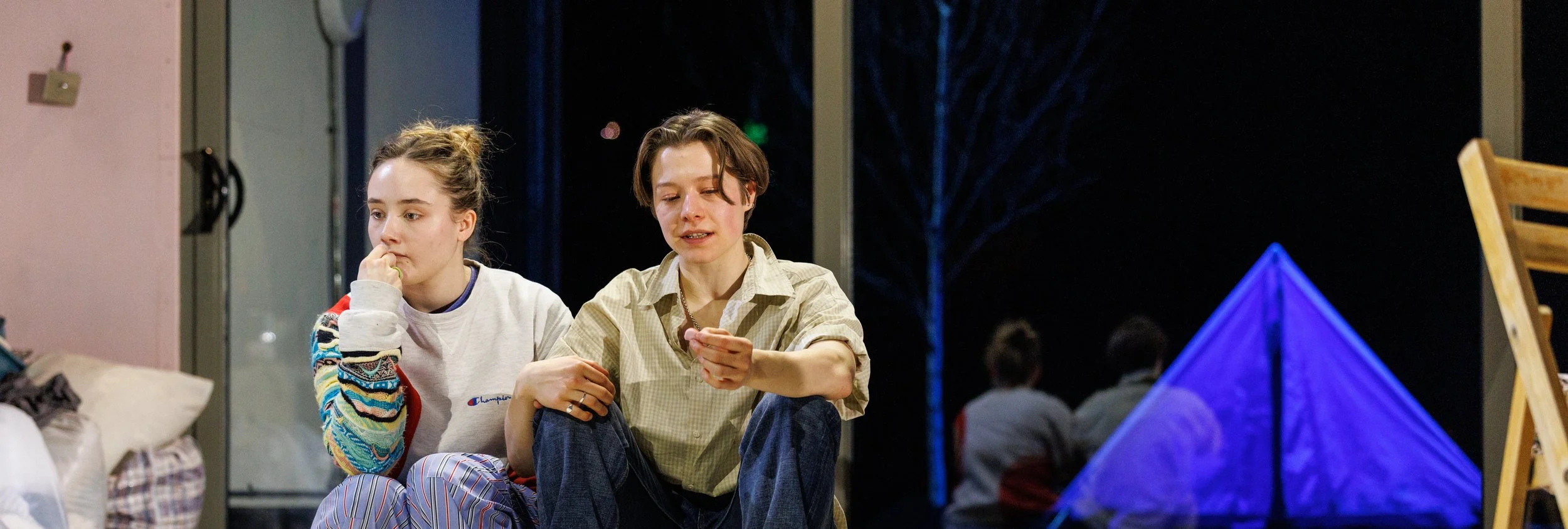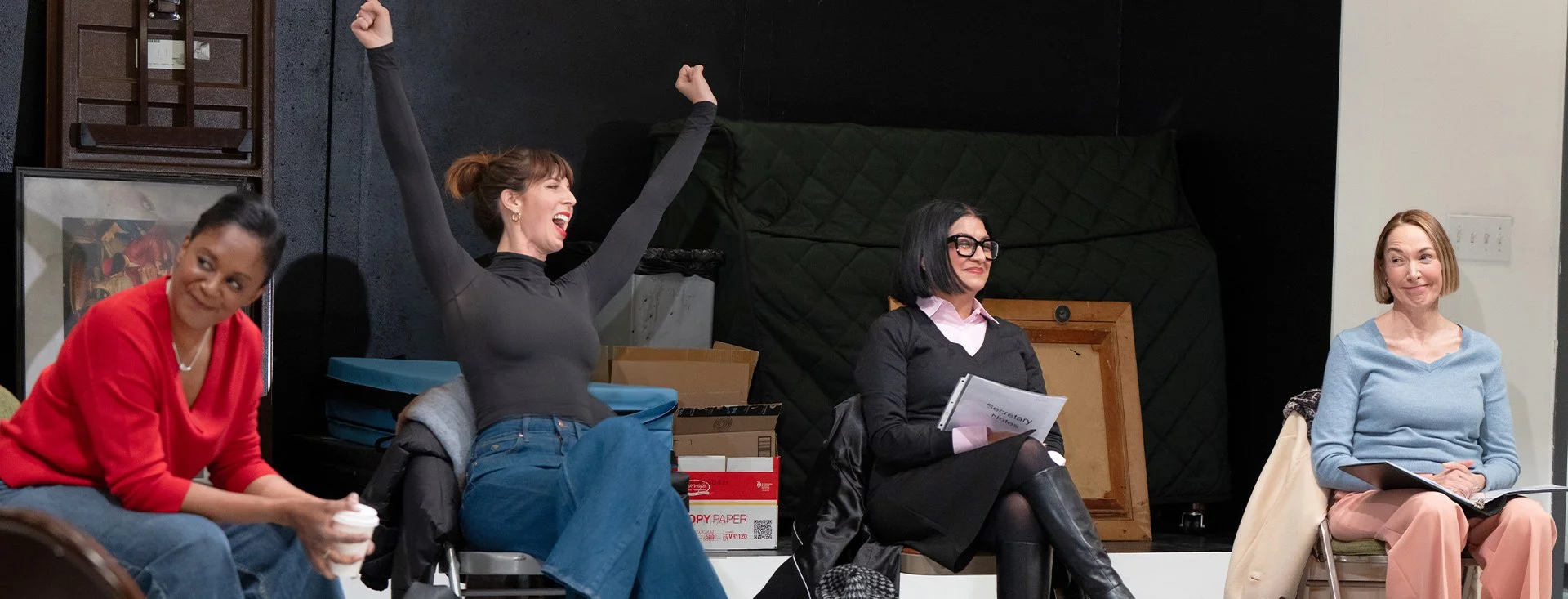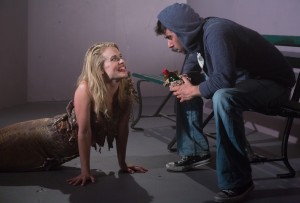Theatergoers who blenched at the subject matter of Edward Albee’s 2002 play The Goat; or, Who Is Silvia? will have a slightly easier time if they attend Inanimate, Nick Robideau’s play that opens the Flea’s new home on Thomas Street in Tribeca—but not by much. Robideau's subject matter parallels that of Albee, who wrote about a man in love with a goat. While Albee’s play is grounded in naturalism—the outlandishness of the premise contrasts with the upheaval of an otherwise normal family life—Robideau takes a different and less successful tack, embracing absurdism for a sexual disorder that is already at the fringes of credibility.
A Slanted Perspective
The reality in New York City and the rest of the modern world can seem absurd, morbid and mysterious from one minute to the next. Troy Deutsch’s In a Tilted Place shows just how strange life can really get. The production is a series of nine outlandish short plays, or wild scenes, and opens with a giddy, young woman (Cassandra Stokes-Wylie) retelling her “very, very real” dream. In her dream, she saw herself as a spirited girl, who had faith in God and ate ice cream at her local Dairy Queen. In her small town she “[biked] down Main Street with streamers on [her] handlebars.” Her story starts to take an unexpected turn when she shares about her first love, an “All-American quarterback.” She had group sex with her football player boyfriend and a brown, squirrel mascot who had “actual squirrel fur,” small paws and human eyes.
These creepy twists and turns are consistent throughout In a Tilted Place, and theatergoers wonder what this show is trying to say about the world we live in. The characters are in environments that seem normal at first and then their circumstances become bizarre and surreal. The female characters are often portrayed as controlling, manipulative, sex-crazed maniacs and the men are aloof, unavailable, drunk or driven mad by women. The value of this production is its ability to present ordinary, day-to-day life as uncanny, odd and whimsical. In a Titled Place is able to disgust, enlighten and provoke audience members.
In the second play, Chanel Chance, a lonely, desperate, young woman Ella (Kelsie Jepsen) sits in a cafe and tries to read Donna Tartt’s Pulitzer Prize-winning novel, “The Goldfinch.” Ella catches the gaze of a young man (Ronald Peet) sitting at another table and asks, “Are you someone? I’m sorry. But I noticed… Are you watching me? I’ve been looking over here and…” Their quirky exchange quickly becomes heated and even more awkward when Ella discovers that her own father has been paying this young man to spy on her. Ella forcefully kisses the man and demands, “Just look at me. Just smell me. Smell me. Smell my neck. Smell it. Smell it.” It is like watching a weirder version of an episode from “The Twilight Zone.”
This is Peet’s opening scene and his heavenly voice is abruptly overshadowed by Jepsen’s frenzied performance as she dominates the space. Peet is an exceptional actor from the Bahamas who graduated from the Tisch School of the Arts Drama program at New York University. Directors Ashley Brooke Monroe and Courtney Ulrich could balance out this scene by having Peet speak directly to the audience more often and have Jepsen slow down a bit. In a later play, Glowing Dinoflagellates, Peet plays naive and impressionable Benjamin. Benjamin is seduced by a powerful, horny, middle-aged woman (Pamela Shaw) to stay at her vacant inn on a cliff. Peet and Shaw’s authentic chemistry and first-rate performances complement each other extremely well and create a solid foundation for other actors to shine. Sex slaves (Sean Kazarian and Michael Kingsbaker) generously contribute to heightening this scene by bringing comic relief as they ramble on in unison about their torturous stay at the inn.
This production’s material is too insular and will likely not travel beyond audiences who enjoy fringe theater. In Brown Fish, a young woman sits on a bench in a concrete park and confesses to her male friend about her roommate’s poop cabin. She describes the poop cabin as “A brown, self-induced, feces log cabin. Like from pioneer days. But the logs, instead of wood, were made of poop.” Wider audiences may not appreciate this production’s unconventional subject matter and style.
The set design by Kate Noll is uncomplicated with a few pieces of furniture and gray, bland walls that look like concrete. Viewers get the sense that these characters exist between a rock and a hard spot. It is like watching a group of people living in an emergency exit hallway in the basement of a skyscraper, and they do not know that the building is on fire. This minimalistic approach is not distracting and allows for audiences to focus solely on the performances. The simplicity works when a mermaid (Rachel Moulton) slowly drags herself across the floor and onto the stage in Call Me Daryl Hannah. Audiences are captivated watching her struggle as she pulls her body and huge fin across the bare, hard surfaces to meet a young, drunk man (Kingsbaker) sitting on a park bench.
In a Tilted Place relies on shocking and unusual subject matter to create tension and mystery. Audience members can turn into distant bystanders who are merely observing. As observers, they can become disconnected from these unique characters and not know how to relate. A clearer overall aim and vision could create a deeper appreciation for this production’s willingness to transcend traditional ideas.
In a Tilted Place runs until Aug. 30 at the IRT Theater (third floor of 154 Christopher St. between Washington and Greenwich Sts. in Manhattan). Evening performances are Monday, Friday and Saturday at 8 p.m. and matinee performances are Sunday at 3 p.m. Tickets are $18 and can be purchased by calling 800-838-3006 or visiting BrownPaperTickets.com.









